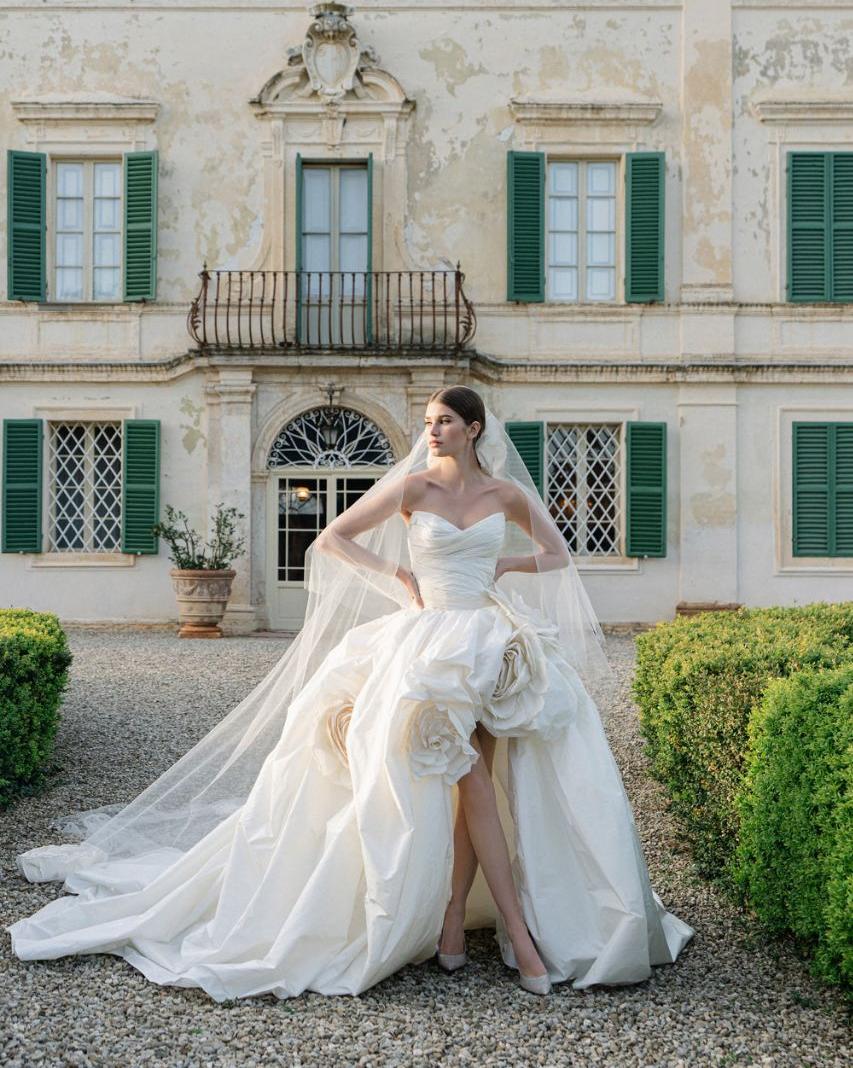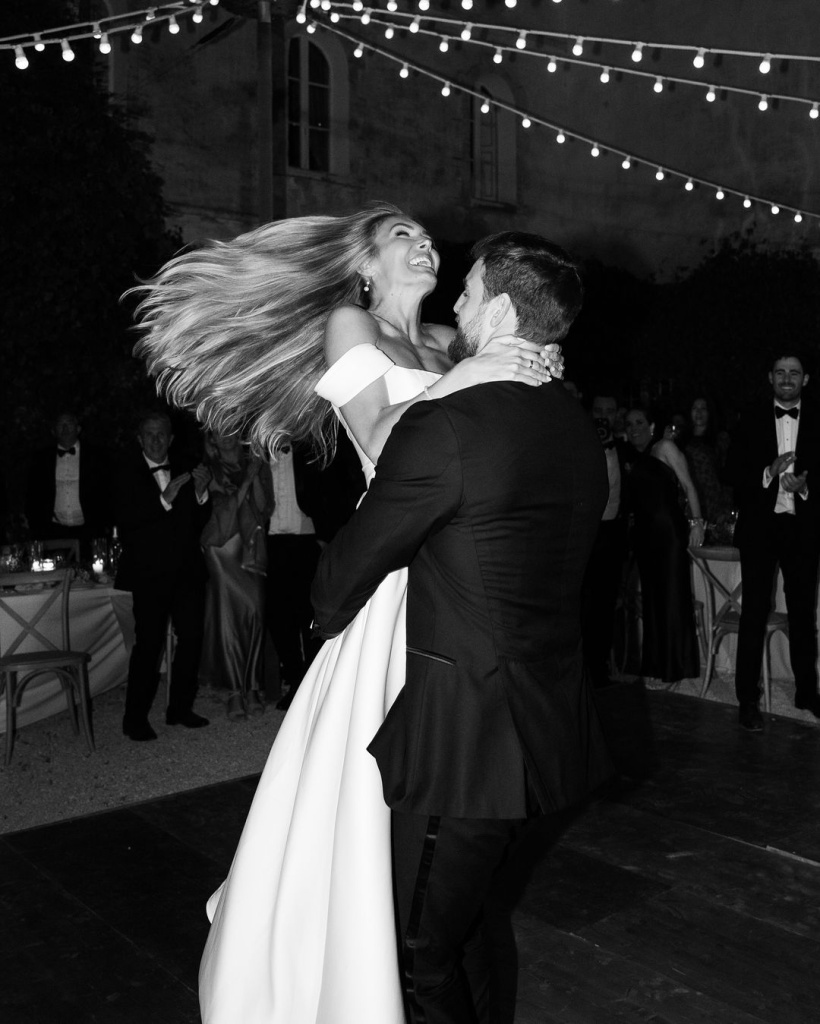Why We Say "Speak Now or Forever Hold Your Peace"
- Author: Natali Grace Levine
- Reading time: 5 min 26 sec
- Publication date: 08/07/2024
- Updated: 01/13/2025
<p>
Weddings—a celebration of love, a gathering of family and friends, and a ceremony filled with tradition. Among these traditions, there’s one phrase that almost always catches the attention of guests: "Speak now or forever hold your peace." This iconic line from countless movies and books seems to promise a last-minute twist in the plot. But what does this phrase really mean, and why is it such a staple at weddings? Let’s dive into the origins, meanings, and modern-day relevance of this famous wedding phrase.
</p>
<div class="double-images">
<figure><img width="410" alt="450454460_1863374487498792_3877653141784888129_n.jpg" src="/upload/medialibrary/755/mhr5tycd5twyzlo8mwcmt1xebi42l0h4.jpg" height="513"> <figcaption>Photo by <a href="https://wezoree.com/vendors/profile/6531-jose-villa/" target="_blank">Jose Villa</a></figcaption> </figure> <figure><img width="410" alt="450418055_479791497975623_7295576297289170878_n.jpg" src="/upload/medialibrary/5ff/8ky5rr8gt5yqwox0h7vrheim7qsflw73.jpg" height="512"> <figcaption>Photo by <a href="https://wezoree.com/vendors/profile/6531-jose-villa/" target="_blank">Jose Villa</a></figcaption> </figure>
</div>
<h2>What Does "Speak Now or Forever Hold Your Peace" Mean?</h2>
<p>
The phrase "Speak now or forever hold your peace" is more than just a dramatic pause in the ceremony; it’s a final call for transparency before a binding legal and emotional commitment is made. This line is traditionally a safeguard, ensuring that all present agree that the marriage should proceed without legal hindrances or personal grievances. It gives the audience a moment to reflect on any knowledge they might have that could impact the validity of the union. This might include any legal reasons like undisclosed previous marriages or issues related to consent.
</p>
<p>
The phrase emphasizes the seriousness and the binding nature of marriage, highlighting it as a contract not just between two individuals, but one that involves and affects a community. In a broader sense, it is about honesty, ensuring that the couple enters into marriage with full disclosure and community blessings.
</p>
<h2>Where Does "Speak Now or Forever Hold Your Peace" Come From?</h2>
<p>
This age-old phrase traces its roots back to the medieval era, a time when marriages were community affairs and often arranged for strategic alliances and familial benefits. The inclusion of this phrase in the wedding ceremony by the Church of England was aimed at preventing invalid marriages which could lead to complex legal disputes.
</p>
<p>
Historically, the announcement of wedding banns, where upcoming marriages were declared in advance, served a similar purpose, allowing anyone with objections to come forward before the day of the ceremony. The phrase has endured through centuries, embedded deeply in cultural and religious practices associated with marriage. It reflects a time when personal and familial histories were not as easily verifiable as today, making this verbal check a crucial part of the ceremony.
</p>
<h2>Is "Speak Now or Forever Hold Your Peace" Required at Weddings?</h2>
<p>
No law or modern wedding requirement mandates the inclusion of "Speak now or forever hold your peace" in wedding ceremonies. Its use is entirely at the discretion of the couple and can be influenced by cultural traditions, personal preferences, or the religious context of the ceremony.
</p>
<p>
Many modern couples choose to omit this phrase to maintain a positive and affirming atmosphere throughout their special day. For those who uphold the tradition, it often serves more as a nod to heritage and ritual than a genuine solicitation of objections. Legal concerns that might have once been aired publicly are now typically handled privately long before the wedding day.
</p>
<div class="double-images">
<figure><img width="410" alt="405398291_18400920169015440_2704221603288480004_n.jpg" src="/upload/medialibrary/657/cypnjoqrz7s39xcbdty0mb94mfva231v.jpg" height="513"> <figcaption>Photo by <a href="https://wezoree.com/vendors/profile/6167-photographer-david-abel/" target="_blank">David Abel</a></figcaption> </figure> <figure><img width="410" alt="406457229_18400920154015440_8718135508593677641_n.jpg" src="/upload/medialibrary/8bd/vzfhp1fpymkuxy9cdxhpxafnblmul1ku.jpg" height="513"> <figcaption>Photo by <a href="https://wezoree.com/vendors/profile/6167-photographer-david-abel/" target="_blank">David Abel</a></figcaption> </figure>
</div>
<h2>What Are Some Alternatives to "Speak Now or Forever Hold Your Peace"?</h2>
<p>
As weddings evolve to reflect modern values and individual tastes, many couples are replacing "Speak now or forever hold your peace" with alternatives that foster a more supportive environment. Let’s take a look at some of them:
</p>
<ol>
<li>Communal Affirmation: Instead of inviting objections, the officiant asks the entire assembly, “Do you, the friends and family of this couple, support and bless this union?” This invites a positive group response and reinforces community support.</li>
<li>Moment of Support: The officiant can invite guests to offer a moment of silence for reflection, then ask them to signify their support by standing, clapping, or another affirming gesture.</li>
<li>Family Blessing: Directly ask the parents or family members to verbally affirm their support and blessings for the couple, creating a warm and familial moment.</li>
<li>Declaration of Support: Guests could be invited to sign a wedding certificate or a guest book as a symbol of their support and presence at the union, serving as a physical token of communal affirmation.</li>
<li>Open Affirmations: Provide a time during the ceremony for guests to briefly share personal blessings or positive wishes for the couple’s future, turning the potential negative space into one filled with love and good hopes.</li>
<li>Unity Ritual: Incorporate a unity candle, sand ceremony, or similar symbolic act where the couple and perhaps family members participate to visually demonstrate the joining of lives and the support of family and friends.</li>
<li>Ring Warming Ceremony: Rings are passed through the hands of all present, each person holding them momentarily to imbue them with warm wishes or prayers for the couple’s future, fostering a sense of communal love and unity.</li>
</ol>
<p>
These alternatives can help ensure that the ceremony remains a celebration of love and community support, avoiding the traditional call for objections and instead emphasizing the positive aspects of the couple’s union.
</p>
<div class="double-images">
<figure><img width="410" alt="371356272_280505021364910_2375364008658129874_n.jpg" src="/upload/medialibrary/e34/0fmlk6mqknu155f6qhwhj2dxwtl03qig.jpg" height="518"> <figcaption>Photo by <a href="https://wezoree.com/vendors/profile/12700-sarah-tonkin/" target="_blank">Sarah Tonkin</a></figcaption> </figure> <figure><img width="410" alt="371013322_1901643526896022_9211432691481086974_n.jpg" src="/upload/medialibrary/435/qx0pkcqhlk6811xou1kq4v2vub15zn12.jpg" height="518"> <figcaption>Photo by <a href="https://wezoree.com/vendors/profile/12700-sarah-tonkin/" target="_blank">Sarah Tonkin</a></figcaption> </figure>
</div>
<h2>Can a Wedding Still Happen After an Objection?</h2>
<p>
While it might seem like a plot twist in a romantic drama, in real life, an objection at a wedding doesn’t automatically halt the proceedings. The nature of the objection would need to be assessed—only a lawful impediment, such as one party already being legally married or the couple being related in a way that prevents legal marriage, would have legal grounds to stop the wedding. Most objections that might arise are typically resolved before reaching the day of the ceremony, with contentious personal or family issues often handled privately.
</p>
<p>
If an objection is raised, the officiant may pause the ceremony to address and verify the claim, consulting legal documentation if necessary. In many cases, the objection might be noted but the ceremony proceeds, with the issue to be legally explored afterward if required.
</p>
<h2>Do People Actually Object at Weddings?</h2>
<p>
Real-life wedding objections are extremely rare, contrary to the dramatic scenes depicted in films and literature. When they do occur, they're generally not the surprise bombshell moments seen on screen. Instead, they're usually based on prior, well-known conflicts or legal issues that have not been adequately resolved before the day. Wedding planners and officiants often work with couples well in advance to foresee and smooth out any potential conflicts that could arise on the wedding day.
</p>
<h2>The Impact of "Speak Now or Forever Hold Your Peace" Today</h2>
<p>
The phrase "Speak Now or Forever Hold Your Peace" holds a significant place in wedding ceremonies, carrying a rich history and evolving impact. Despite its decreasing practicality in the legal sense, its cultural and symbolic significance remains evident in both traditional and modern contexts.
</p>
<ol>
<li>Dramatic Element in Media: In films, television shows, and books, this phrase is often used as a climactic plot device to introduce tension or a twist, reinforcing its dramatic legacy.</li>
<li>Symbol of Open Communication: Even in contemporary settings, the phrase can serve as a reminder of the importance of transparency and honesty in relationships, emphasizing that marriages should be entered into with full disclosure.</li>
<li>Legal Formality: In some traditional ceremonies, it still functions as a legal formality to prevent unlawful marriages, though this practice is less common in many places due to pre-wedding legal checks.</li>
<li>Cultural Tradition: For many, the inclusion of this phrase is a nod to cultural and familial traditions, maintaining a connection to historical wedding practices.</li>
<li>Community Involvement: It underscores the role of the community in the marriage process, reflecting the societal belief that marriages are not just unions of two individuals but of entire communities.</li>
<li>Evolution Towards Positivity: Modern adaptations of the phrase are shifting towards more positive affirmations of support and unity, reflecting changing attitudes towards marriage and community roles.</li>
<li>Discussion Starter: The phrase often sparks discussions about its relevance and appropriateness in modern weddings, encouraging couples to think deeply about the traditions they wish to uphold or modify.</li>
</ol>
<div class="double-images">
<figure><img width="410" alt="453606261_322177617656794_7396774853857535731_n.jpg" src="/upload/medialibrary/beb/3uyu2l1uo7l9z6xmc3q2yxalbj2x16b3.jpg" height="513"> <figcaption>Photo by <a href="https://wezoree.com/vendors/profile/9900-photographers-andrew-bayda/" target="_blank">Andrew Bayda</a></figcaption> </figure> <figure><img width="410" alt="453428781_8111567568935174_3453084102239332555_n.jpg" src="/upload/medialibrary/592/ndl1rbz1pl7r1u52wr6l69nd9q4rfhxr.jpg" height="513"> <figcaption>Photo by <a href="https://wezoree.com/vendors/profile/9900-photographers-andrew-bayda/" target="_blank">Andrew Bayda</a></figcaption> </figure>
</div>
<p>
In conclusion, "Speak Now or Forever Hold Your Peace" continues to evolve, blending its historical roots with contemporary values. Its enduring presence in wedding ceremonies, whether as a traditional safeguard, a dramatic element, or a cultural artifact, speaks to its deep-seated significance in the matrimonial landscape. As society progresses, the phrase may see further transformations, but its impact on the collective consciousness about marriage and community involvement is likely to remain influential.
</p>














